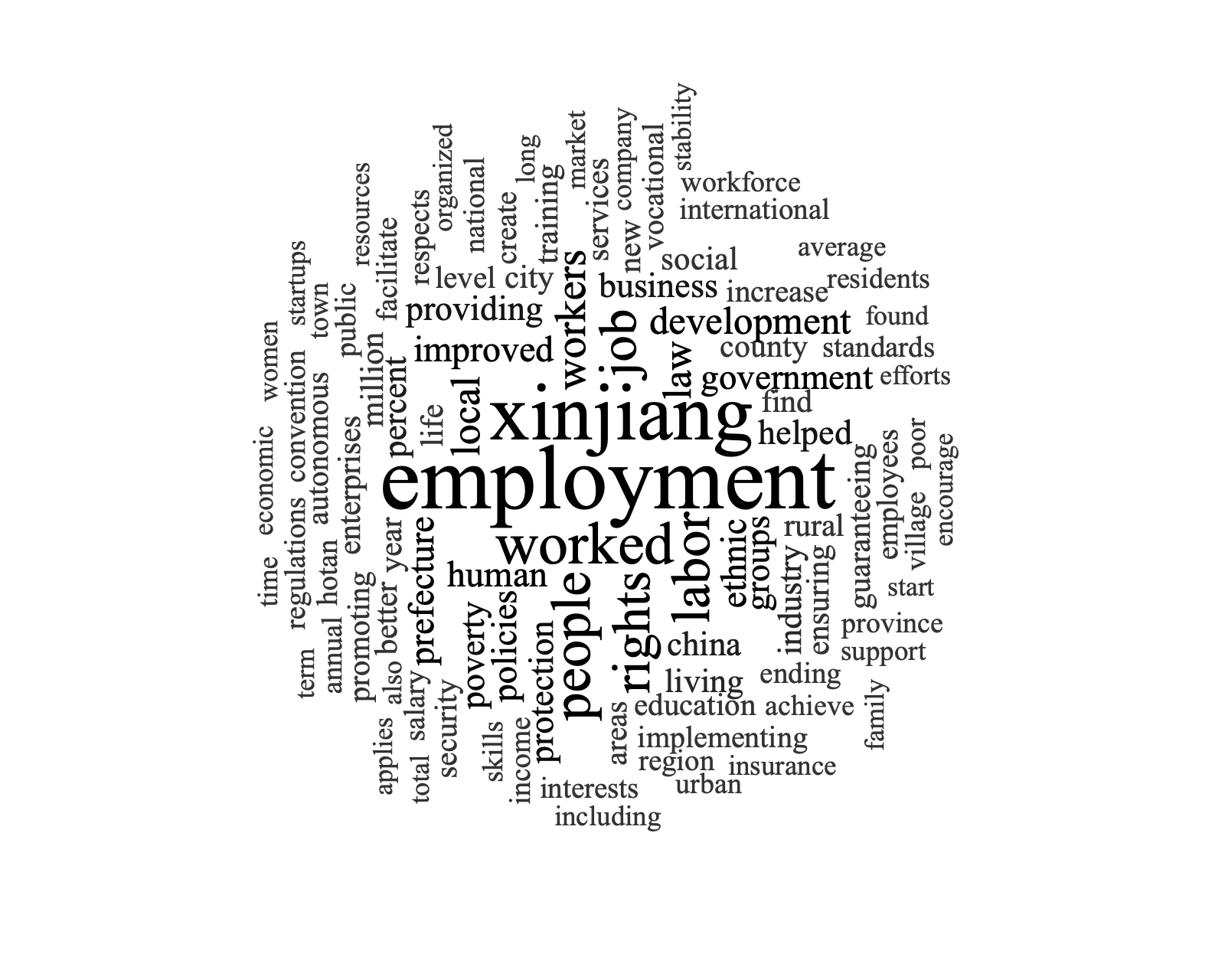Original document link: Click Here
Overview
This paper focuses on current employment statistics and conditions within Xinjiang Uyghur Autonomous Region, reviewing labour rights of workers, and presenting the government’s case that China is meeting its commitment to international human rights and labour standards.
The paper highlights the increase of workers and job opportunities noting that “every year from 2014 to 2019 Xinjiang provided training sessions to an average of 1.29 million urban and rural workers”. This is presented as pivotal to the strategy in Xinjiang to eradicate all poverty by the end of 2020. The region is working on a plan to support “human rights through development, and strive to eradicate poverty through education and training, capacity building and employment”.
Due to this development, the paper notes, Xinjiang has seen an increase of people moving from rural areas to urban communities to support the increase in demand for labor-intensive industries. Upgrading infrastructure is seen as vital to increasing employment specifically through the Belt and Road Initiative and the “new industrial zones to increase rural labor”.
Households in Xinjiang are “identified, registered, assisted, and ensured stable employment”. The paper notes that this is to ensure the “targeting specific communities to increase stable employment” and to ensure that there are no zero-employment households in the area. This is part of an encompassing plan to ensure that “…each household has access to job opportunities, each person has work to do, and each month goes with an income”. This is echoed in the paper by the call for “a change in mindset” that focuses on the idea that “only hard work can bring a better life”.
The paper emphasizes the government’s commitment to equal access to employment and “…no discrimination against workers on the basis of ethnicity, region, gender, and religious belief.” This coincides with the right to remuneration, rest, leisure, and participation in social insurance.
The paper reaffirms the government’s stance on human rights via the “proactive employment policy, protect[ing] the lawful labor rights and interests of people of all ethnic groups” specifically in Xinjiang. China remains committed to “fulfilling international convention obligations” and is working to eradicate poverty in the Xinjiang region. As a response to the introduction of the ILO’s Decent Work Agenda, China has adopted the Decent Work Country Program for China (2016-2020), emphasizing “the concept of decent work into national policies and development plans”.
Lastly, the paper notes the misconception of international media regarding the working conditions of Xinjiang stating:
“For years, certain international forces, guilty of ideological bias and prejudiced against China, have been applying double standards in Xinjiang, criticizing ‘breaches of human rights’ while ignoring the tremendous efforts Xinjiang has made to protect human rights. They have fabricated facts to support their false claims of ‘forced labor’ in Xinjiang, and smeared the local government’s work on employment and job security. Their acts amount to a denial of the fact that the local people in Xinjiang enjoy the right to work, aspire to move out of poverty and backwardness and are working towards that goal.”
The paper concludes by reiterating the importance of work to ensure a happy and fulfilling life. It notes that Xinjiang is an example of this commitment through the creation of jobs. Lastly, President Xi Jinping is quoted saying that “employment is pivotal to wellbeing” and that the long-term stability of a society depends on the work of everyone.
| 15 most common words | |
|---|---|
| Word | Count |
| employment | 130 |
| Xinjiang | 110 |
| worked | 71 |
| people | 63 |
| labour | 61 |
| rights | 59 |
| job | 57 |
| workers | 41 |
| local | 36 |
| law | 34 |
| development | 32 |
| human | 28 |
| ethnic | 28 |
| improved | 27 |
| prefecture | 27 |
Word cloud:
(Minimum 5 letters)
